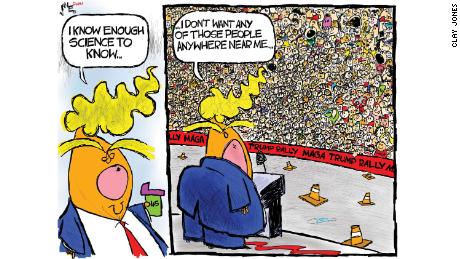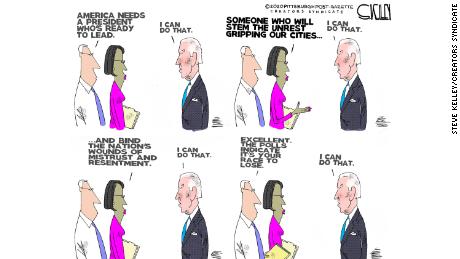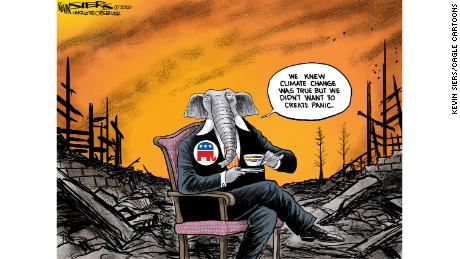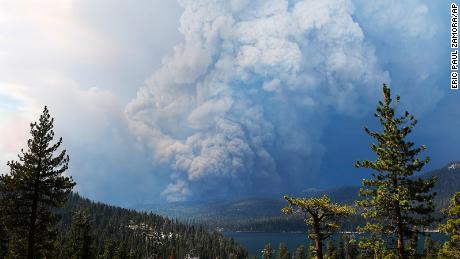Now Republicans, led by McConnell, are blowing up their own precedent and saying they would vote on a Trump nominee for Ginsburg’s seat in the remaining months of Trump’s term. (They are unlikely to be deterred by Ginsburg’s hope which she expressed to her granddaughter: “My most fervent wish is that I will not be replaced until a new president is installed.”)
“Filling the seat in the next 46 days — or, if Democratic presidential nominee Joe Biden wins in November, before January 20, 2021 during the lame-duck portion of Trump’s term — would take American democracy to the breaking point,” wrote Josh Douglas, who teaches law at the University of Kentucky, the school where McConnell got his law degree.
“Both sides would dig in their heels. The nominee, whoever he or she is, will face mud-slinging and partisan attacks that would make the extremely vitriolic confirmation of Justice Brett Kavanaugh look tame in comparison. At least half of Americans would never view a new justice under these circumstances as legitimate. Ever.”
McConnell and the Republicans could rethink their stance and wait, Douglas said. “Or they can push forward to grab power at all costs, knowing that doing so will damage democracy even further.
Senator McConnell: how do you truly wish to be remembered?“
Two hours and a million miles away
In the American version of the mockumentary series “The Office,” the needy, dim lead character Michael Scott, branch manager of Dunder Mifflin’s Scranton, Pennsylvania office, displays a fascination with the glitz of New York City.
As played by Steve Carell, Scott is the archetype of cluelessness: “
Do I need to be liked? Absolutely not. I like to be liked. I enjoy being liked. I have to be liked, but it’s not like this compulsive need to be liked, like my need to be praised.”
The city, two hours away from Scranton by car, is where he goes clubbing, tries (and fails) to impress executives at the fictional paper company’s headquarters and crashes corporate parties to gorge on leftover sushi.
In real life, the distance between Scranton and New York City is suddenly an issue in the race for the White House. Speaking at CNN’s drive-in town hall Thursday in that rust-belt city which is his birthplace, Joe Biden framed the campaign as “between Scranton and Park Avenue.” Clearly, he would like voters to see the contest as a choice between the authentic son of working-class Pennsylvania and Donald Trump, the privileged son of a multi-millionaire.

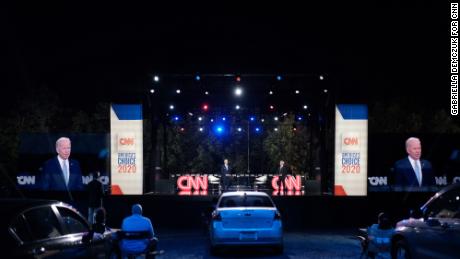
Joe Biden speaks at the CNN Presidential Town Hall in Scranton, Pennsylvania.
Trump won the state four years ago by less than a percentage point. And it’s expected to be crucial again this year. “Right now, Pennsylvania looks like the single most important state of the 2020 election,” wrote
Nathaniel Rakich in
FiveThirty Eight.
Trump also faced voters in Pennsylvania, in this case for a town hall Tuesday at the National Constitution Center in Philadelphia. College professor
Ellesia A. Blaque told him of her lifelong struggle with the disease sarcoidosis and asked how he planned to protect people with pre-existing conditions. “Rather than allowing me to finish my question — as I had to respectfully demand him to do — or answering my question directly and honestly,
the leader of the free world made me feel like an inanimate object,” Blaque wrote for CNN Opinion. “He rambled and repeated the same claim that a new health care plan — better than the Affordable Care Act — was on its way.”
More than three-and-a-half years into the administration, there is no new health care plan, and Trump’s team is backing a court case that aims to kill Obamacare, which does provide insurance for people with preexisting conditions, wrote John Avlon.
“Trump and his administration just can’t stop talking about his nonexistent health care plan. It’s going to be great, ‘everybody’s going to be taken care of’… there will be insurance for everybody … no one will lose coverage … ‘there will be no cuts’ to Medicaid … and ‘no one will be worse off financially.’ Those are just some of the repeated promises President Trump and his administration have made about his phantom plan. And like some two-bit con man, he keeps saying it is just about to be unveiled, just a few weeks around the corner
… just you wait.”
It didn’t go well
The town hall format didn’t “go well” for Trump, wrote conservative commentator
Scott Jennings: “The President had a few decent moments” but is better off “
in a pugilistic debate with an opponent than he is in addressing individual voters.” Trump “often drifts into difficult-to-follow tangents” and “tried to have a compassionate moment with the immigrant who recently became an American citizen, but he didn’t understand her mom had died of breast cancer and not coronavirus.”
To
Frida Ghitis, Trump “looked like a fast-talking salesman hawking an inferior product.” She argued, “The most obvious conclusion one can reach watching Trump lie about his own record and about what Biden proposes, is that
Trump simply does not believe he has a superior plan to offer voters.”
Trump’s lukewarm reception in Philadelphia contrasted with the acclaim he receives at his rallies. But that comes at a price for his audience, noted
Dean Obeidallah. “Trump held a rally in Nevada that violated the state’s rules on limiting events to 50 people, ignored the state’s mask mandate and jammed people on top of each other … Trump is not just exposing his supporters at the rally to the virus. He’s also sending an alarming message to the nation that social distancing mandates can be ignored.
This is beyond irresponsible, it borders on sinister given that Trump fully understands how easily transmittable and fatal this virus could be.”
Prepared and angry
In Scranton,
“Biden was prepared and he was angry,” wrote Democratic strategist
Jess McIntosh. “It was a tautly restrained outrage as he described the failings of President Donald Trump, and he seemed to hold back tears multiple times as he fielded questions from Americans experiencing overwhelming fear and loss amid the deadly coronavirus pandemic.”
Biden demonstrated authenticity and empathy, wrote
Alice Stewart, a Republican commentator. That will help him with voters, she argued, but he made mistakes that could cost him in the upcoming debates. Biden retreated from an earlier comment that as president he would impose a national mask mandate and suggested that he would phase out fracking, “thus transitioning countless Pennsylvania fracking workers out of jobs,
with no clear sense of how they could find new ones.“
“The real test comes when both candidates take to the first debate stage on September 29th,” Stewart wrote. “No amount of on-stage social distancing can diminish the impact of that face-to-face contrast of candidates.”
In a column for the
Financial Times,
Janan Ganesh laid out an intriguing argument that Biden’s flat affect could be an advantage. “The US has had two consecutive presidents with messianic followings, and it is worse off for the 12-year surge of emotion. No democracy is riper for a period of tepid leadership … The problem, in other words, is not Mr. Biden’s failure to kindle passion in people. It is our psychic need for such a person in the first place. His election might reacquaint the US with politics as it should be and has been: a machine for the arbitration of conflicting claims, and not as the basis of one’s whole identity.”
All the President’s Men
Michael Caputo, the chief spokesman for the Department of Health and Human Services, is taking a two-month leave of absence after he shared false conspiracy theories that scientists in the administration are plotting against Trump and that Biden will refuse to concede if Trump wins. “And when Donald Trump refuses to stand down at the inauguration, the shooting will begin,” Caputo said in a live video hosted on his Facebook page.
These are not the first inflammatory remarks Caputo has made, noted
Michael D’Antonio, who called him
“a person perfectly suited for the Trump administration” and said, “others in the administration show a similar flair for chaos, ignoring the norms of their offices…”
Trump’s attorney general, William Barr, also came under scrutiny this week for controversial comments. Speaking at a Hillsdale College event, Barr said, “you know, putting a national lockdown, stay at home orders, is like house arrest. Other than slavery, which was a different kind of restraint, this is the greatest intrusion on civil liberties in American history.”
Many were stunned by the remark.
Brandon Tensley wrote, “That Barr painted a few months of being told — or as it was in many cases, asked — to stay home during a global pandemic as being
even remotely in the same category as the practice of enslavement is ridiculous.” As he noted, “For hundreds of years, enslaved Africans were beaten, tortured, raped and treated as property.”
Barr’s comments on the election have drawn equally strong criticism. “By repeating false and misleading statements about the potential for voter fraud and post-election violence, Attorney General William Barr has stepped out of his role as the nation’s chief law enforcement officer and marred the 2020 elections,” wrote election law expert
Richard L. Hasen. “This parroting of President Donald Trump’s unsupported rhetoric is
irresponsible and dangerous, turning the job of the Department of Justice as the protector of voting rights on its head.”
Meanwhile, Barr’s Justice Department launched a criminal investigation into John Bolton’s publication of a book harshly critical of the President.
Elie Honig called it “
equal parts futile and dangerous … the move appears to signal a pernicious effort to use the Justice Department’s might to punish perceived political enemies of President Donald Trump.”
For more on politics:
Divorce from science
Visiting California Monday as the state was fighting epic fires, President Trump told an official, “It’ll start getting cooler,” Trump said. “You just watch.”
“I wish science agreed with you,” replied Wade Crowfoot, the official.
“I don’t think science knows, actually,” Trump said.
Science actually knows, wrote John D. Sutter.
“Fires are tearing across the West. Five tropical storms are spinning in the Atlantic; that’s happened only once before. Siberia hit 100 degrees Fahrenheit this year. Death Valley, 130. A report from the World Meteorological Organization said that the five-year period from 2016 to 2020 is expected to be the hottest on record … We’ve warmed the planet about 1.1 Celsius since the Industrial Revolution.
We’re already living with the dystopian results.”
The nation’s 75-year long relationship with science is undergoing a divorce, wrote Naomi Oreskes, professor of the history of science at Harvard University.
The bargain, struck in 1945, was that “America would support science” by funding research “and in return science would support America, through technical innovation that would better our material conditions and information that would enable us to face life’s challenges and solve them.” But, as news spread of the appointment of a climate science denier to help run NOAA, the agency that provides guidance on climate, that deal is off, Oreskes wrote.
“This administration has
repeatedly placed people who have questioned or rejected science in positions of authority throughout the federal service. Vice President Pence rejects evolutionary theory and suggested that smoking doesn’t kill, and the President himself, as is well known, has claimed that climate change is a hoax.”
For an example of what science can achieve, read
Sara Seager‘s account of
the work her team did on a sign of potential life on Venus.College reopenings
Covid-19 is spreading rapidly on reopened college campuses, and there have been at least 88,000 cases, according to a New York Times tally. Dr. Kent Sepkowitz, an infectious disease expert, wrote, “we find ourselves in a self-inflicted debacle with equally grim options for moving forward and a disengaged federal government. Leaving infected students in colleges will only amplify the infection numbers and…threaten to overwhelm a town; but sending them home also promises a disastrous, if different, ripple of cases and chaos.”
“In allowing their students to return, leaders, who are the heads of universities where Covid-19 spikes have happened,
have failed miserably,” he argued.
The reopenings happened for two reasons, wrote
Lincoln Mitchell. “Colleges and universities needed to make sure students enrolled for the fall in order to
get revenue from housing, food and related fees. That meant they had to persuade families that college would be safe and relatively normal when the new academic year started.” And in red states, there was political pressure for state universities to align with Republicans’ push for reopening.
Last month the Big Ten conference suspended the football season as a result of the pandemic, noted
Christine Brennan in USA Today. Then “Trump, desperate to win votes in Wisconsin, Michigan, Ohio and Pennsylvania, told the conference to play football,” she wrote. “Originally, the league stood its ground. Rutgers president Jonathan Holloway aptly called it ‘cheap politics.’ But wouldn’t you know, the university presidents ended up following right along, giving Trump exactly what he wanted.” Wednesday became “the darkest day in Big Ten sports history, the day the vaunted conference caved.
It choked. It got scared.“
Don’t miss
AND…
On the move
Tess Taylor packed her go-box a while ago. Living through her family’s fourth straight fire season in the Bay area, she had already experienced a couple of red flag warnings and so was ready to leave at any moment. When daytime darkness set in a week ago Wednesday, she packed the contents of her refrigerator into a cooler and the family set out for a cabin friends rent out on the eastern side of the Sierra Mountains. But the mountain range was “completely obscured by falling ash.”
“My husband and I looked at each other. We could not bring ourselves to drive home. We bought some hot dogs at a forlorn-looking stand in South Lake Tahoe. And then we floored it, further east.”
The smoke cleared “somewhere just outside Fallon, Nevada. Emerging outside it was a bit like being in that scene where Dorothy arrives in Oz, and the world flips back to color. I marveled at the reddish sand, at the delicate sage, at the wide cobalt blue of the sky.”
And then they kept driving. Destination: the in-laws’ farm in South Dakota. “We were simply so fatigued by this year’s version of the horror show that we drove half across the country to a place where
we knew that we could reliably inhale and exhale.”
![]()






